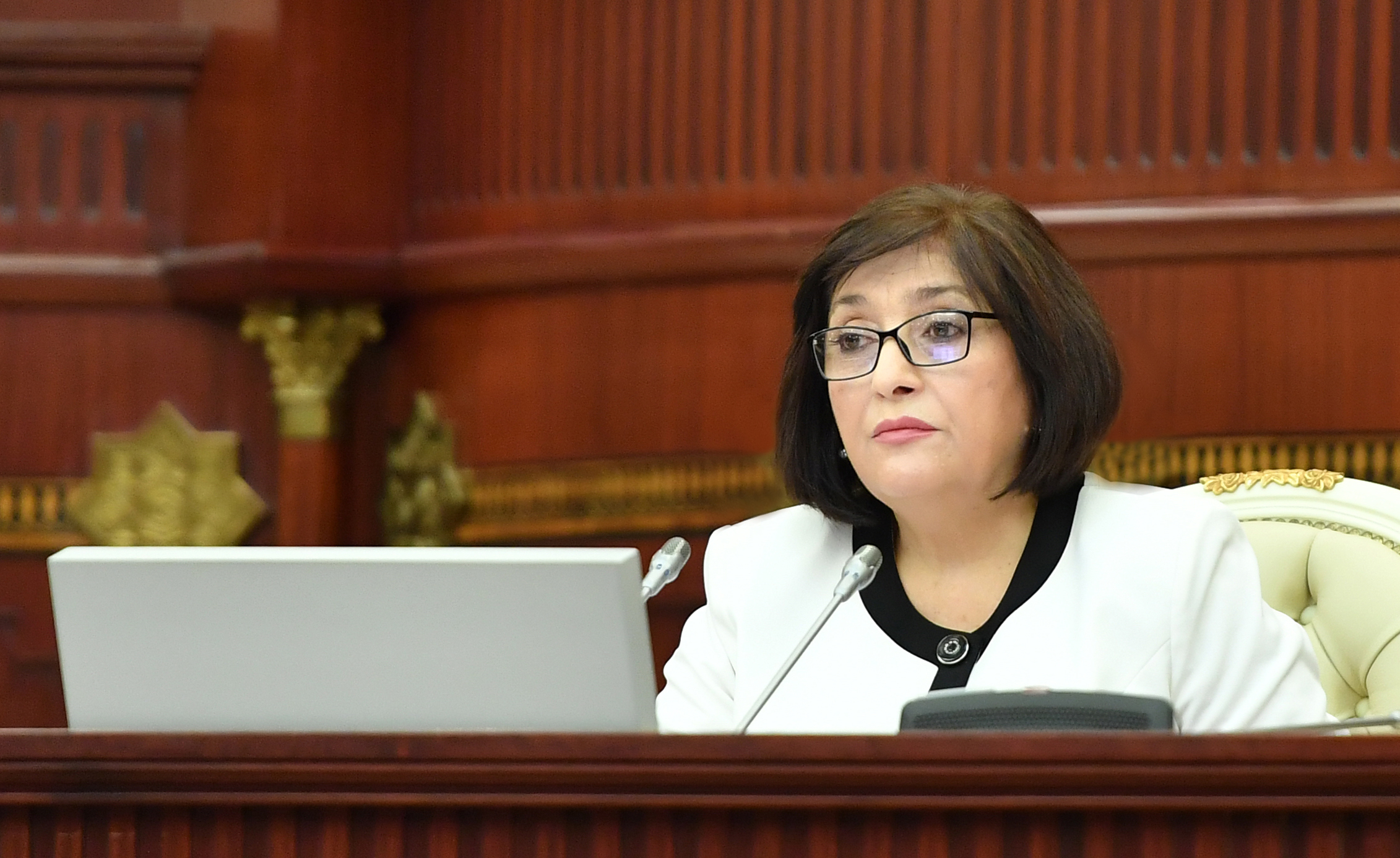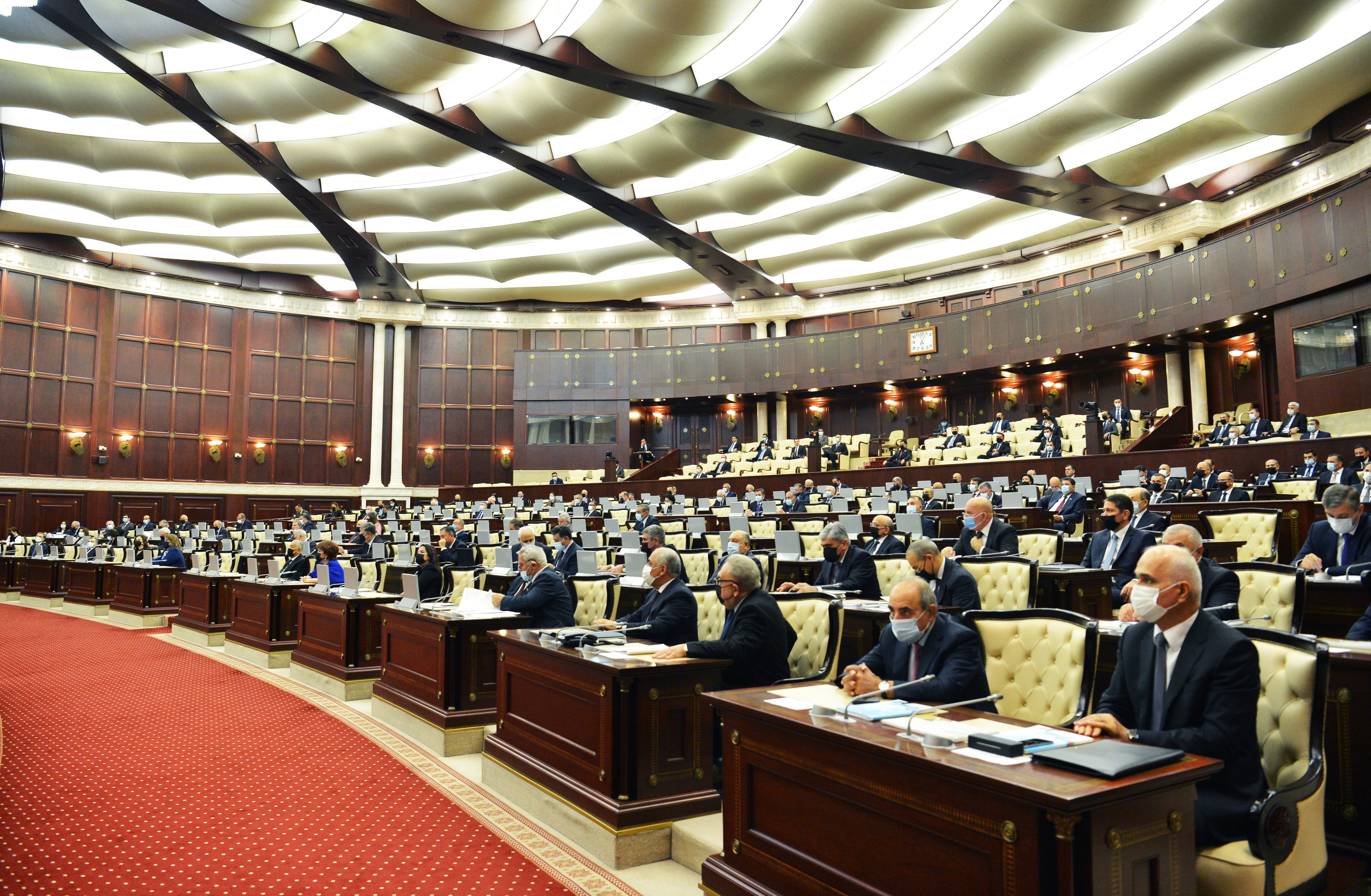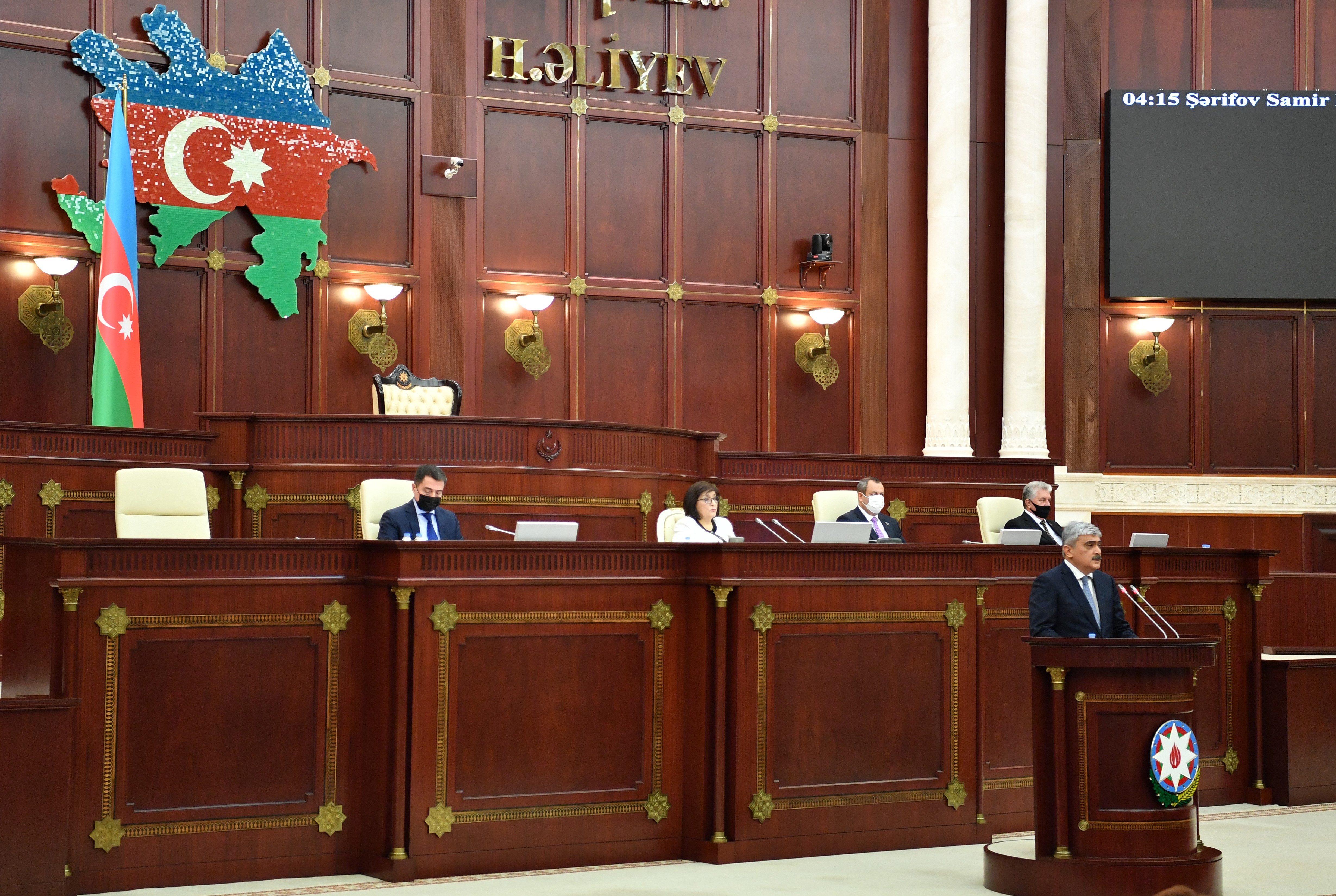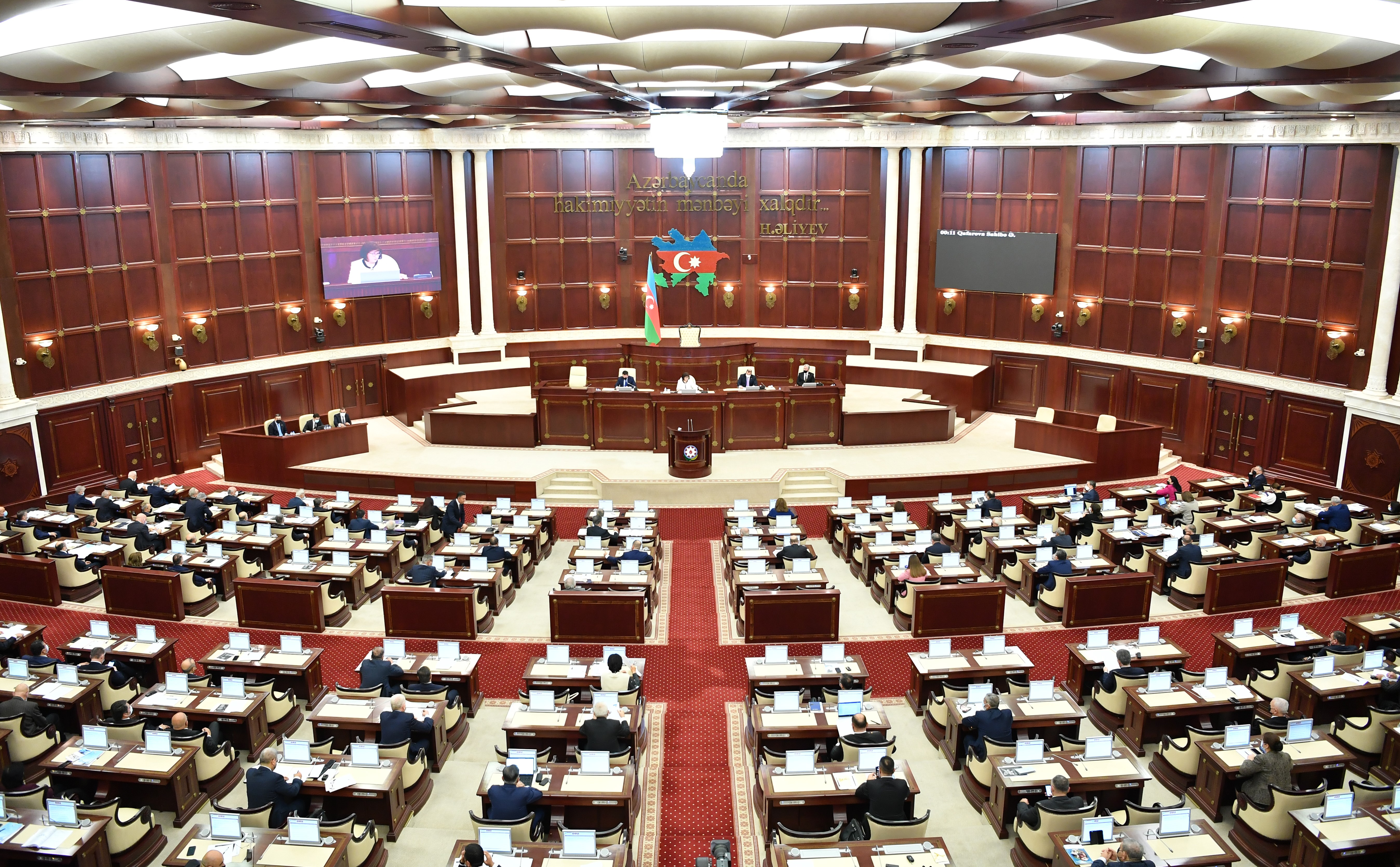Budgetary Package Deliberations Begin at a Milli Majlis Plenum
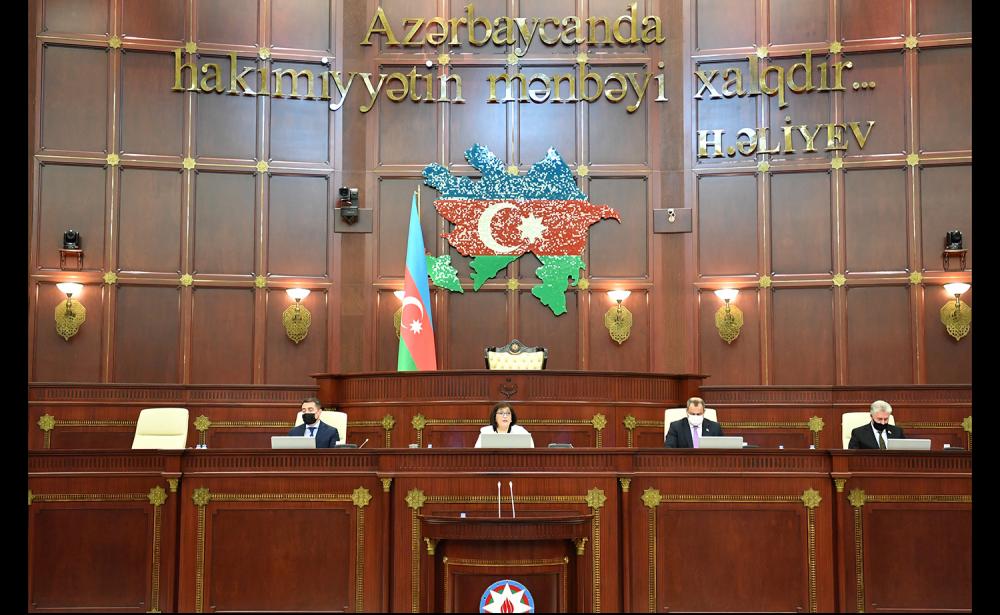
At the scheduled parliamentary plenum that was held on 16 November, Chair of the Milli Majlis Sahiba Gafarova welcomed the government regulators, MPs and the mass media people, and began an account of the 8th summit meeting of the Co-operation Council of the Turkic-Speaking States that had taken place in Istanbul on 12 November.
Several decisions were passed at that summit gathering that are important for making the Turkic-speaking states’ integration processes yet more profound, according to Mrs Gafarova who stressed that one event had taken place at the same assembly of which our people could be proud. To be specific, the Council awarded President Ilham Aliyev of the Azerbaijan Republic with the Turkic World Supreme Order; the decoration was done by President Recep Tayyip Erdogan of the Republic of Turkey. That award is conferred upon our esteemed President for the de-occupation of territories of the Azerbaijan Republic and restoration of the national territorial wholeness, which made for a considerable input in the Turkic unity whilst also being a historic victory that had brought sustainable peace and stability to the region.
Sahiba Gafarova, who spoke on behalf of the Milli Majlis, congratulated the president of the country cordially on the decoration with the Turkic World Supreme Order and wished him great successes in his tireless efforts for the today and the tomorrow of our nation and state. Her congratulations caused a wave of applause.
The 24-item agenda of the plenary sitting was adopted then.
Madame Speaker said that 22 out of the 24 items, all submitted in the first reading, were the Bills concerning the next-year state budget of the country and the drafts in the Budgetary Package.
Item 1 was about the Bill ‘On the 2022 State Budget of the Azerbaijan Republic’. The Chair of the Milli Majlis commented on it by saying that the main financial document of the state and its parameters, all constituting an inseparable component of the general public finances, let one judge on the economic condition of the country. In this sense, the State Budget draft and the documents in the Budget Package being tabled before the House reflect correctly the economic realia of our country, according to Sahiba Gafarova.
The Chair of the Milli Majlis said with satisfaction that the socio-economic development strategy currently in implementation made our state’s dynamic advance possible despite the continuing coronavirus pandemic and the global economic activity that had not quite regained its pace yet. The largest budget in the history of the country ever is submitted to the Milli Majlis; it is for the first time that the next-year budget spending will approach AZN 30 bn, which represents an increase by AZN 1 bn 336 mn from the current-year counterpart. So, the 2022 State Budget is a firm guarantee that the strategic tasks ahead are going to be fulfilled.
What else the leader of the Parliament said was that the 2022 State Budget Bill and the Budget Package had been discussed thoroughly at the meetings of the parliamentary committees before they had been cleared for the submission at a plenum of the Milli Majlis. The Budget deliberations that the Economic Policy, Industries and Enterprising Committee had organised had gone with the attendance of the heads and activists of the parliamentary political parties who had been invited over. Each one of them had been given the opportunity to put forth his or her opinion. Besides, the Chamber of Accounts had released a benign opinion statement about the Package.
Sahiba Gafarova expressed her confidence that the forthcoming plenary deliberations would be productive and that valuable opinions of the MPs would be heard.
Then, Chairman of the Economic Policy, Industries and Enterprising Committee Tahir Mirkishili took over to say that the Bill ‘On the 2022 State Budget of the Azerbaijan Republic’, the Budget Package and the opinion statement by the Chamber of Accounts had been compiled and sent up to the Milli Majlis in compliance with the relevant legislative requirements.
It was for the first time that members of the in-parliament political parties – including the opposition ones – had joined the discussion of the Budget Package. That happened on the instance of Chair of the Milli Majlis Sahiba Gafarova and that was how the discussion had been made inclusive. Besides, that was another step taken in the implementation at the supreme legislative body of the political reforms that are in progress in the country.
Referring to the victory in the Patriotic War, the committee chairman mentioned that a comprehensive examination of the de-occupied territories of the country had revealed their subjection to urbicide (destruction of towns and villages), cultocide (destruction of cultural heritage) and ecocide (destruction of nature and ecology). The Azerbaijani State began the fast-paced work this year to eliminate the aftermath of that tragedy and a considerable amount of work was carried out in a rather short period in part related to de-mining those lands, implementing restoration and rebuilding projects and creating the required infrastructure. Mr Mirkishili mentioned restoration of the monuments of culture in Shusha, construction and launch of the international airport of Fuzuli and the started use of road infrastructure. All that showed the world both the creative motivation and the power of the Azerbaijani State with sufficient clarity.
Tahir Mirkishili also touched on the pandemic and the vaccination efforts, saying that it had been planned to have vaccinated at least 40 per cent of the population by the year-end whilst more than 44 per cent were vaccinated as it was.
Further, the GDP that slid by more than 3 per cent during 2020 was expected to rise by 5.9 per cent in 2021. The choice made in favour of digital transformation and fostering green economy in both Garabagh and East Zangazur as priorities will bring our country considerable advantages.
That the dynamic growth tempo and the proper correlation of the 2021 State Budget revenue and spending plans have been maintained, that the budgetary deficit is much smaller than forecast, that the balance of payments accounts have the persistent positive dynamics, that the non-oil exports and non-oil tax collections have shown a substantial growth and the macro-economic stability preserved in the country have all made the solid foundation upon which the 2022 State Budget was planned out.
Going on, Tahir Mirkishili mentioned the adequacy of the presented Budget Bill with its revenues and expenditures set at AZN 26.8 bn and AZN 29.9 bn respectively to the current and strategic development agendas, the economic policy of the country and the future challenges it will be tackling.
Then, Minister of Finance Samir Sharifov offered a thorough overview of the 2022 state and consolidated budgets and the consolidated budgets for the next three years.
First, the minister talked about the victory in the Patriotic War that had become a triumph of national pride. He talked also about the liberation of our lands after close to thirty years of captivity and about Azerbaijan’s having set in motion a new epoch by restoring the integrity of its national territory.
According to the Minister of Finance, restoring and rebuilding the freed lands make the number one priority in the intended expenditures of the approaching year. Already our territories which the foul enemy had sacked and looted for long years are getting a new lease of life. Motorways and railway liens are built, the power, gas and water supplies and agricultural infrastructure is being put in place, monuments of history, culture and religion are becoming restored and international airports are constructed. The preparations for the great return, the restoration and re-construction of the liberated provinces with their reintegration into the national economy and the accompanying build-up of the national defence prowess and national security are the matters that add up to one of the five-year socio-economic development priority tasks set for until 2030 – the President of Azerbaijan defined those in February this year. The 2022 State Budget is drafted based on the mindfulness of all those priorities and based also on the macro-economic indications contained in the document that the Ministry of Economy has drawn up.
Then, the Minister of Finance told of the main parameters of the State Budget, noting that the 2022 revenues and expenditures were forecast at AZN 26 bn 816 mn and 29 bn 879 mn AZN, respectively, with the State Tax Service expected to collect AZN 8 bn 820 mn whereas the task set for the Customs Committee envisages AZN 4 bn 260 mn. Off-budget revenues are planned at AZN 760 mn and the other revenues at AZN 260 mn. At the same time, there will be a transfer from the State Oil Fund to the State Budget in the amount of AZN 12 bn 710 mn. The consolidated budget revenues and expenditures are set at AZN 27 bn 677 mn and AZN 32 bn 906 mn correspondingly.
It is planned to allocate AZN 2.2 bn towards the costs of restoring and rebuilding the de-occupied territories as well as of reintegrating Garabagh and East Zangazur with the national economy.
Raising, with the effect from 1 January 2022, salaries, retirement pensions, social benefits, other pensions and social payments, all to improve the public well-being and ensure social protection of the population, is the cornerstone of the Budget. As he said this, Samir Sharifov stressed that the State Budget remained a socially-oriented one traditionally. He mentioned the increase of the social spending to 46.4 per cent of the Budget with a rise by 13.5 per cent or AZN 1 bn 650 mn compared with 2021 so that the ultimate amount will be AZN 13 bn 851 mn. At that, 60 per cent of that grand total or AZN 8 bn 97 mn has to do with work remuneration due for payment during 2022. As for the social protection costs, the relevant forecast spending off the next-year Budget is forecast to make AZN 3 bn 566 mn.
Education is another priority area and the corresponding State Budget spending forecast suggests AZN 3 bn 884 mn, according to Mr Sharifov. Yet another priority, namely, health care, will cost the State Budget AZN 1 bn 789 mn, which sum includes the compulsory medical insurance fees under the facility that was geared into operation this year.
And it is planned to allocate AZN 44 mn and AZN 59 mn for youth affairs and sports, and for tourism development, in that sequence.
The Minister of Finance also supplied the House with detailed information about the revenues and expenditures of the 2022 Budget of the Nakhchivan Autonomous Republic, and about the allocations from the national State Budget due to cover agriculture, environmental and nature protection, transport, telecommunications and housing & utilities and, last but not least, to underpin the soft mortgage lending.
Minister of Economy Mikayil Jabbarov was the next speaker. He told the MPs that the fundamental reforms that are being carried into life in our country under the guidance of the Head of State served the cause of ensuring the growth and accelerated modernisation of the national economy hand in hand with continual improvement of the public welfare. Azerbaijan is transiting to a new stage of strategic development, one that will cover the years 2022-2030 and will see more sustainable economic growth drivers fall in use, further increment in the national economy’s competitiveness, innovativeness and financial stability and the reintegration of the liberated lands. The Minister remarked as he spoke of the main feature of the budgetary policy that the State Budget was to finance the restoration of the de-occupied territories in parallel to its other tasks and goals.
It is planned, at the suggestion of the President of Azerbaijan, to raise the state investment programme allocation by AZN 850 mn to AZN 2.8 bn next year. Besides, according to Mr Jabbarov, the next-year SB envisages such points as implementation of large-scale social programmes and the planned increases in the minimum salary, pensions and other social fees.
The Minister then said regarding the current economic situation that all the economic sectors except construction had shown faster growth rates. The GDP rose by 4.8 per cent in January-September this year. The average annual increment of growth in the non-oil industries exceeded 20 per cent in M921 as against 9.3 per cent during 2017-2020. The strategic foreign exchange reserve of the country equalled USD 53 bn e/o October 2021 accounting for 110 per cent of the forecast annual GDP. As regards the non-oil exports of M1021, they showed an increase by 42 per cent – the highest ever. On the whole, the 2021 non-oil exports are anticipated at a level above USD 2.4 bn.
The Minister also told the House that the large-scale government programmes designed to support the economy in the face of the pandemic had played an important part in reclaiming and running up economic growth in the country this year. More than 243,000 hired employees had been paid in excess of AZN 250 mn in the aggregate and almost 108,000 unincorporated (micro) business runners had been supplied with the financial aid totalling at AZN 113 mn in that context by 1 November.
The tax pickings of M1021 rose by 16 per cent to AZN 7.4 bn with a 22 per cent or (more than) AZN 1.3-bn excess of the nine-month forecast. The non-oil tax collections rose by 13 per cent to AZN 5.4 making 116 per cent of the period forecast and 73 per cent of the nine months’ total collections.
It was mentioned that the collections were rising faster in the private sector: by 20 per cent to 56 per cent of the said ten months’ total.
According to the Minister of Economy, the introduction of the new-generation online tills is central to legalisation of trade turnovers: the online till turnovers of M1021 was 1.9 times as much as that of M1020. Retail consumers had been refunded for almost AZN 120 mn through the ‘VAT get-back’ project by 1 October.
Besides, there is considerable headway in labour market legalisation, Mikayil Jabbarov mentioned before informing the Milli Majlis in every detail of the compulsory state social insurance fees collection, the structural reforms initiated in public companies, the new strategy and forecasts for the years 2022-2026, the scope of de-occupied provinces restoration for the next 5 years, those lands’ reintegration and so forth.
Next up, Chairman of the Board of the Central Bank of the Azerbaijan Republic Elman Rustamov talked about the key focus areas of the interest and monetary policy for 2022. The mid-term policy, Mr Rustamov explained, had been formed under the exceptionally difficult external conditions and those conditions’ multichannel negative impacts on the national economy.
The COVID-19 took a complex and unique effect on the economic area just as it did on all the areas, it must be said. The preconditions paramount for elimination of that effect were national governments’ timely response to the problem and managing relevant processes effectively.
The anti-crisis programme put together and launched under the immediate guidance of the President of Azerbaijan, the testing, the prompt and adequate access of vaccine resources, reinforcement of the health care infrastructure and the massive economic support projects averted an economic recession in the country last year whilst also predetermining economic recovery and increment in this year, according to Elman Rustamov.
The CBA Chairman noted as he was giving an overview of the principal macro-economic trends and outcomes of 2021 that the non-oil sector had exceeded its pre-pandemic level with considerable increments of growth observable in all the sub-sectors save the construction one as soon as in Q321. In addition, some sectors even manifested two-digit growth. The non-oil exports of M1021 rose by 42 per cent whilst the accompanying economic reclamation and increase brought about higher employment figures with the natural reduction in the joblessness level in the country. Fiscal stability has been maintained throughout this year. The Budget that had had a forecast deficit developed a net surplus during the same ten months. The state debt remains acceptable and all the State Budget targets are being met.
The foreign trade surplus rose 2.3 times to USD 6.3 bn in M921. Both the foreign trade balance and the balance of payments have net surpluses. The e/o 2021 net surplus of the current account is expected at 8 per cent of the GDP.
There is equilibrium in the currency market. The FX rate of the national currency has been stable since the y/b 2021 with the offer in excess of the demand at the majority of the FX auctions and the manat having experienced a considerable bullish pressure. With the inflation keeping within the tolerable range during H121, the monetary policy of the Central Bank mainly fostered the departure of the national economy from the recession of 2020 and then, its recapture.
Going further, the CBA Chairman talked about the resumed economic growth associated with favourable macro-economic circumstances, the inflation accelerating against the fiscal monetary stability background and the role of unrestrained competition in ensuring the population’s food security. Mr Rustamov also supplied the legislators with ample information about the problems caused by price-hiking and other matters.
Chairman of the Chamber of Accounts Vugar Gulmammadov tabled the Chamber’s opinion statement about the 2022 State Budget. He told of the list of documents drawn up and submitted together with the State Budget Bill – the list that is longer than in the previous years and the quality and scope of the accompanying clarifications and information are higher than they used to be, which the Chamber of Accounts finds to be commendable.
Speaking of the comparative analysis of the information contained in the Budget Package, Mr Gulmammadov said his entity had found some issues highlighted in precedent opinion statements to have been addressed in the present Package. The completeness and comprehensiveness of the parliamentary control over public funds depend, first and foremost, on the array and descriptiveness of the documents and items referenced in Bill deliberations and in execution of the consolidated Budget and its components. The documents now tabled favour budgetary revenues assessment better than before.
The Chamber’s opinion statement contains a number of proposals, too. The Chamber had carried out three extra fiscal risks assessments in regard to the next-year State Budget. Quoting the risks analyses, Mr Gulmammadov told of the findings concerning the main parameters of the State Budget that are written down in this document.
The Chamber of Accounts concludes that the 2022 budget revenues are planned to be greater than in 2021 but their execution is anticipated to be lower than this year. Mr Gulmammadov’s agency believes that there will be no risks associated with either tax or customs collections given the inflation as well economic growth factors forecast for 2022, the forthcoming Tax Code amendments and accelerated bullishness of prices in the trade partners.
Besides, the Chamber’s opinion statement contains the recommendations that are based on its findings and that concern adequate institutional modifications and strengthening of financial control. Those recommendations pertain to such important focus areas as greater transparency and accountability, elimination of current discrepancies and improvement of public funds administration.
Vugar Gulmammadov told the House that the Chamber of Accounts endorsed the tabled draft and hoped that the Chamber’s commentary would prove useful during the deliberations upon the Budget.
On hearing the speakers, the Milli Majlis moved on to deliberations on the 2022 State Budget Bill – the largest in the whole independent history of the Azerbaijan Republic. The MPs Hikmat Mammadov, Mahir Abbaszade, Ziyad Samadzade, Musa Guliyev, Ziyafet Asgarov, Ahliman Amiraslanov, Kamal Jafarov, Sahib Aliyev, Azer Badamov, Ali Masimli, Emin Hajiyev, Elman Nasirov, Razi Nurullayev, Siyavush Novruzov, Kamran Bayramov, Vahid Ahmadov, Elnur Allahverdiyev, Musa Gasimli, Anar Mammadov, Rashad Mahmudov, Zahid Oruj, Shahin Ismayilov, Ilham Mammadov, Javanshir Pashazade, Aydin Mirzazade and Elshan Musayev were active in the deliberations. They analysed the Bill properly and put their considerations, conclusions and proposals to the government officials present at the plenary sitting. The opinion statement by the Chamber of Accounts was spoken of favourably. Also, the House approved of the planned increase in education spending, the social orientation of the State Budget and so forth.
The Bill on the 2022 State Budget of the Azerbaijan Republic was put on vote and approved in the first reading eventually and with that, the plenum of the Milli Majlis was over.
Deliberations upon the Budgetary Package will continue at the Milli Majlis tomorrow.
The Press and Public Relations Department
The Milli Majlis



